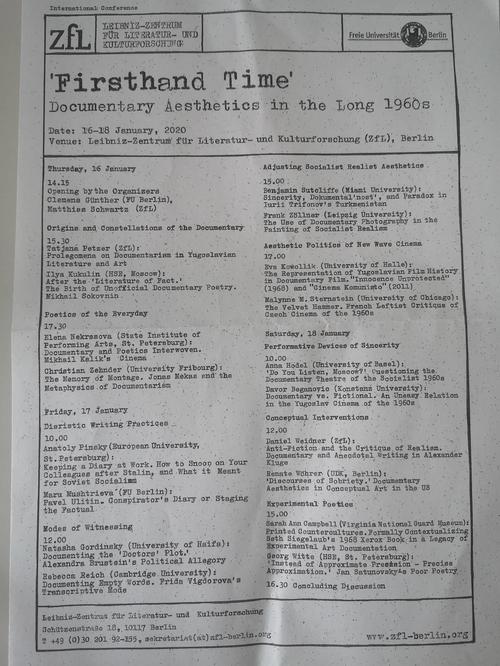Conference: ›Firsthand Time‹. Documentary Aesthetics in the Long 1960s
Conference | 16-18 January 2020 | ZfL
Organisiert von Clemens Günther (Freie Universität Berlin), Matthias Schwartz (ZfL)
Kontakt: Clemens Günther (cguenther@zedat.fu-berlin.de) and Matthias Schwartz (schwartz@zfl-berlin.org)
Referring to documents in ›postfactual‹ times seems anachronistic. Those who seek to expose the evidence of a fact with recourse to documents are today confronted with allegations of forgery or counter-documentation that undermine the supposed plausibility of historical, testimonial or statistical documentation. In order to understand what is currently at stake, our conference turns to the period in which the documentary emerged as an aesthetic, epistemological, affective, and political benchmark. The period to which we refer is the European post-war period in general and the »documentary fashion« (Nikolaus Miller) of the long 1960s in particular. It was during this time that engaged writers, filmmakers, and artists, inspired by a reassessment of the documentary boom of the interwar period, hoped, by the authority of their personal voice, by the immediacy of oral histories, and the forcefulness of authentic source materials to obtain a better understanding of everyday life in past and present. Documentary forms promised to achieve first-hand access to a more sincere understanding of social and political reality. Up until the 1970s, documentarism derived its momentum from the tension between this desire for first-hand accounts and the constant reflection about the (im)possibility of this claim.
While Western manifestations of this documentary heyday (Peter Weiss, Alexander Kluge, and others) have been relatively well researched, the Eastern European trajectory of this boom remains poorly examined. Regarding the current state of scholarship, there are individual studies on nonconformist and dissident voices (e.g. Aleksandr Solzhenitsyn, Moscow conceptualism) or on documentarism as a testimonial strategy dealing with the Gulag, war and the Holocaust. However, as an aesthetic phenomenon that addresses the diversity of faction prose, the exploration of the documentary remains a research desideratum. Our proposal for the temporalization of the ›long 1960s‹ evades the still prevailing distinction between ›thaw‹ and ›stagnation‹ and instead emphasizes the shared experience of a crisis of representation to which the debates on documentary art forms at the time sought to find an answer.
Starting from the specific case of late socialist cultural history, our conference aims to make a systematic contribution to the interdisciplinary exploration of documentary forms in a diachronic and comparative perspective. The focus here will be on the poetics of the documentary, complementing already existing political and ethical contextualizations and historiographies. Contributions dealing with the barely canonized voices as well as with influences and encounters crossing state borders and power blocs were selected for opening up new comparative perspectives beyond national literary contexts.
Zeit & Ort16.-18.01.2020 | ab 14:15
ZfL (Leibniz Center for Literary and Cultural Research)
Schützenstr. 18, 10117 Berlin, Aufgang B, 3. Etage, Trajekte-Tagungsraum

